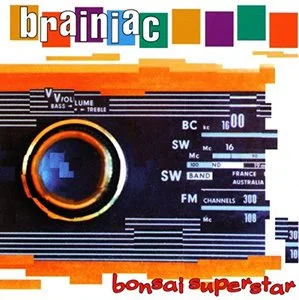
3RA1N1AC
Bonsai Superstar
An airforce town in the American Midwest best known as the birthplace of aviation originator Orville Wright, Dayton, Ohio also boasted a fine funk scene in the mid-70s that included The Ohio Players, Slave and vocoder-funk pioneers Zapp. By the early 90s, however, years after that scene had faded, the shelves of Dayton’s pawn-shops heaved with unwanted synthesisers and noisemakers that ultimately found their way into the hands of local noise-pop quartet Brainiac.
“We picked up these crazy guitars and Moog synthesisers that had been pawned for drugs and left for waste,” remembers guitarist John Schmersal. “In that pre-eBay era, we would search for the most outrageous clothes in thrift-stores, and make these weird, magical finds, like a bag of cassettes of someone’s psychiatry sessions that might end up on our record.”
Schmersal joined Brainiac just before they recorded their second album, 1994’s Bonsai Superstar, but he’d known frontman Timmy Taylor since high school. “Tim came from a really musical family,” says Schmersal. “His father was a Wes Montgomery-style jazz guitarist who’d played with Eartha Kitt and had been gigging for years, Tim playing with him since he was a teen.” Schmersal describes Taylor’s musical background as “regimented, schooled”, two words that scarcely apply to Brainiac. “We were interested in destroying our music, and the paradigms of rock music as ‘serious event’,” he nods.
Brainiac accomplished this mission with a songbook of twisted pop and jerking, Beefheartian punk, studded with archaic synth blurts, blasts of analogue noise and vocals that were distorted by “Radio Shack tech-nerd” Taylor’s battery of pedals, gizmos and gadgets. “Tim was a lovely guy, extremely creative, very eccentric,” remembers Eli Janney, who first met Brainiac when they toured with his group Girls Against Boys, and would go on to produce their three albums. “He wrote these great, crazy melodies, and these songs that were ‘pop’ in their own way, ‘pop’ that he’d deconstructed.”
This idiosyncratic sound blossomed on Bonsai Superstar, though its genesis didn’t suggest a masterpiece was in the making. “Grass Records pushed us to put out a new record, but we weren’t ready,” says Schmersal. “It was not a leisurely thing. We put songs together while on tour, we recorded it in less than a week... Afterwards, as we were driving back to Dayton, Juan [Monasterio, bassist] said he had this sinking feeling, like we’d just made the worst record of all time.”
Au contraire: Bonsai Superstar showcased Brainiac’s audacious and unique bulldozer approach to song structure, their unsettling black humour and punk dynamics, offering up bubblegum pop scored for detuned guitars and broken synths (Hot Metal Dobermans), filthy Mark E Smith-fronting-Blues Explosion rants (Sexual Frustration), creepy plane-crash narratives set to distorted Eno-esque drones (Fucking With The Altimeter), and slithering, off-key and off-colour lounge lullabies (Flypaper), along with Taylor and Schmersal’s disorientating 4-track collages of electronic noise and sounds stolen from broken radios.
“Tim was in his element, experimenting in the studio and working on overdubs,” remembers Janney, “plugging his microphone into some pedals and turning it up so it’s distorting like hell, and sounding so wrong, but so brutal, abrasive and awesome. They were definitely fucking with the status quo of what indie-rock was supposed to be.”
“Tim had a really great singing voice, but he didn’t like the sound of it ‘naked’,” adds Schmersal, “On the last song on Bonsai, Collide, you can’t hear anything he’s singing, it’s too distorted. But it’s a lot more disturbing to hear him sing the lyrics, which read like JG Ballard’s Crash, romanticising a car crash.”
Bonsai Superstar was Brainiac’s last release on Grass, signing with esteemed Chicago underground label Touch & Go shortly afterwards, for whom they’d record 1996 album Hissing Prigs In Static Couture, with Janney at the controls, cutting various EPs with Steve Albini, Jim O’Rourke and fellow Daytonite Kim Deal in the interim. Beck took them under his wing while touring his Odelay album, and Trent Reznor was interested in working on their fourth album, while a Major Label deal with Interscope was rumoured to be in the offing.
It was not to be. On the night of May 23, 1997, Taylor was overcome by fumes from a faulty exhaust pipe and crashed his car, dying instantly. Brainiac split immediately, drummer Tyler Trent later joining The Breeders, Schmersal going on to form similarly inventive, wilful rockers Enon. “It was a tragedy, in every sense,” says Janney. “Who knows what Timmy’s limits would have been?”
While never getting the chance to infect the mainstream with their sick art-rock contortions, Brainiac’s impact is felt in the bands they inspired, and continue to inspire: band as diverse as Muse, Liars and Blood Brothers. “They were mind-blowing,” says The Mars Volta’s Cedric Bixler-Zavala, “like a trashy version of future punk-rock music, with such a bizarre and dark sense of humour. Whenever I’m working out what to do with my vocals, I think ‘What would Timmy Taylor do?’ I treat that question like one of Eno’s Oblique Strategies cards, and it’s never steered me wrong.”
(c) Stevie Chick, originally published in MOJO magazine, 2012